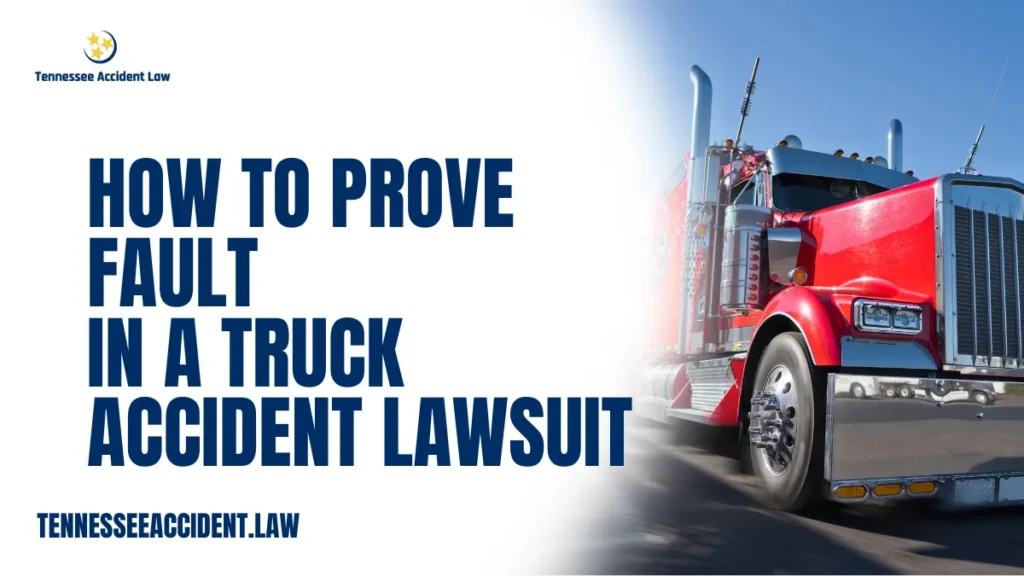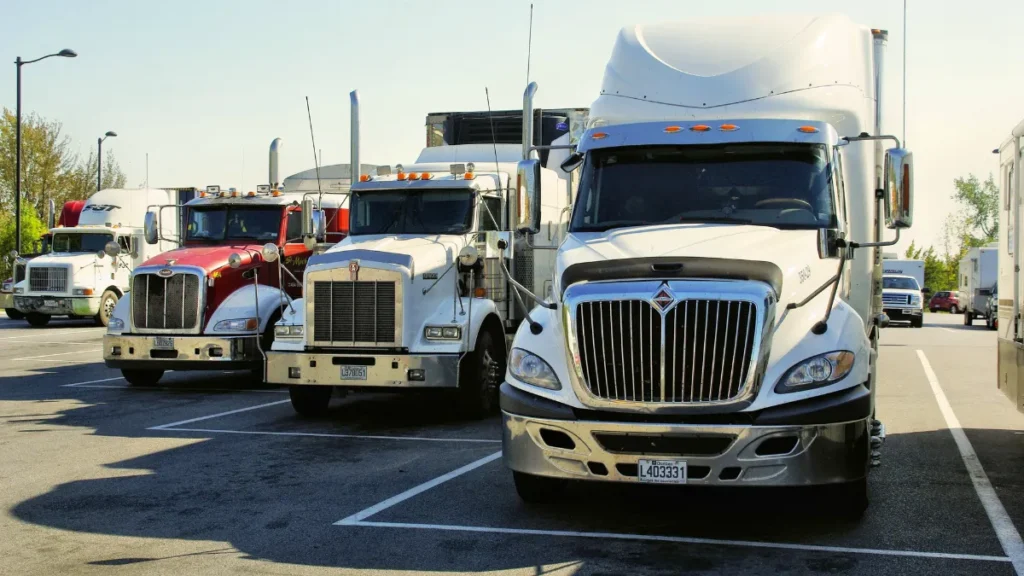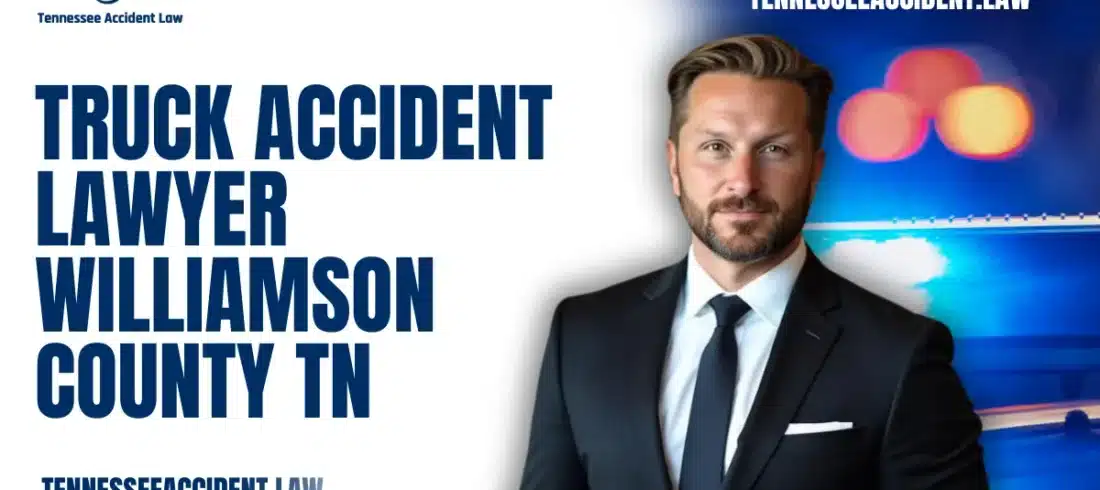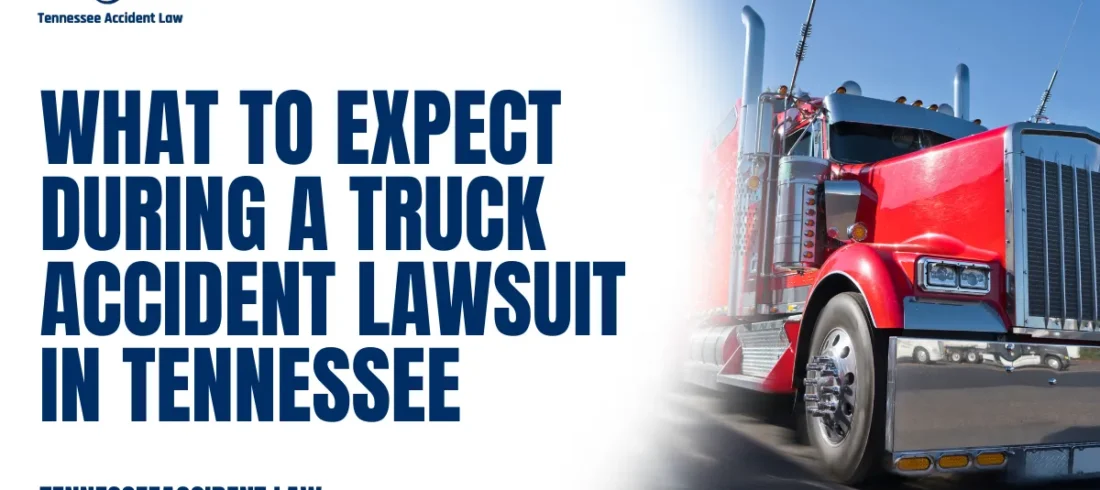
When involved in a truck accident, proving fault is crucial to securing compensation. Truck accidents often result in severe injuries and significant property damage, making the stakes incredibly high. If you or a loved one has been injured in a truck accident, knowing how to prove fault in a truck accident lawsuit is essential. At Tennessee Accident Law, we are dedicated to helping victims of truck accidents navigate the complexities of these cases and pursue the compensation they deserve. This guide will provide a comprehensive look at the process of proving fault in a truck accident lawsuit.
Call us now at 615-212-9866 or complete our free case evaluation form to get started on your case today.
The Importance of Proving Fault in Truck Accidents
In the aftermath of a truck accident, determining who is at fault is essential for securing compensation. Unlike smaller vehicle accidents, truck accidents often involve multiple parties, such as the truck driver, the trucking company, maintenance providers, and even third parties. Proving fault in truck accident cases is not always straightforward. The burden of proof lies with the victim or plaintiff, who must demonstrate that the defendant’s actions or negligence directly caused the accident and resulting injuries.
The legal concept of fault in a truck accident is based on the negligence of one or more parties involved. This negligence could be the truck driver’s failure to follow traffic laws, the trucking company’s inadequate maintenance of the truck, or a failure to properly load the truck. Establishing fault is critical, as it directly impacts the compensation a victim can receive for their medical expenses, lost wages, and pain and suffering.
Key Steps to Prove Fault in a Truck Accident
To effectively prove fault in a truck accident, several key elements must be established. Let’s break down the steps involved in proving fault in truck accident cases:
1. Gather Evidence from the Scene
The first step in proving fault is gathering evidence from the accident scene. Immediately following the accident, it’s vital to document as much information as possible. This includes taking photographs of the damage, the position of the vehicles, road conditions, and any visible skid marks or debris. Additionally, getting witness statements can help strengthen your case. If there are traffic cameras or nearby surveillance footage, these can provide crucial evidence of what happened before and after the collision.
2. Investigate the Truck Driver’s Actions
In many truck accident cases, the truck driver’s actions play a significant role in the accident. Proving fault in truck accident cases often involves examining the driver’s behavior leading up to the incident. Common driver errors include:
- Distracted driving (e.g., texting, eating, using a GPS)
- Driving under the influence of alcohol or drugs
- Speeding or driving too fast for conditions
- Fatigue due to long hours of driving
- Failure to obey traffic laws, such as running red lights or not yielding the right of way
To prove that the driver was at fault, your legal team will need to investigate their driving history, their logbook (for signs of driver fatigue), and whether they were in violation of Federal Motor Carrier Safety Administration (FMCSA) regulations.
3. Examine the Trucking Company’s Role
In some cases, the trucking company may also share responsibility for the accident. Trucking companies are required to adhere to strict regulations to ensure their vehicles are safe for operation. This includes performing regular maintenance, inspecting the truck, and properly training their drivers.
Proving fault in truck accident cases against the trucking company involves looking into the company’s practices, such as:
- Whether the truck was properly maintained
- If the driver had received adequate training
- Whether the company followed regulations regarding driving hours
- If the truck was overloaded beyond its weight limit
If the trucking company failed in any of these areas, they could be held responsible for the accident.
4. Investigate the Truck’s Maintenance Records
Fault can also stem from mechanical failures or poor maintenance of the truck. Trucks are large, complex machines that require regular inspections and maintenance. A failure in the truck’s braking system, tires, or steering could lead to an accident. Proving fault in truck accident cases related to maintenance failures involves obtaining the truck’s maintenance records.
Your legal team will work with experts to analyze whether any mechanical issues played a role in the crash. If the trucking company neglected regular maintenance or ignored necessary repairs, they could be held accountable for the accident.
5. Use Expert Testimony
In complex truck accident cases, expert testimony can play a crucial role in proving fault in truck accident lawsuits. Experts can analyze accident reconstructions, driver behavior, and vehicle conditions to determine the cause of the crash. These professionals can provide valuable insight into the technical aspects of the accident and help prove the fault of the driver, the trucking company, or another party.
6. Consider the Role of Third Parties
Sometimes, third parties like maintenance companies or cargo loading firms are involved in truck accidents. If an accident was caused by improperly loaded cargo or a defect in the vehicle’s parts, these third parties may share liability. Proving fault in truck accident cases involving third parties requires an investigation into their actions or negligence.
For example, if the truck was carrying cargo that was not properly secured, causing the truck to become unbalanced and crash, the company responsible for loading the truck could be held liable. Similarly, if a faulty part caused the accident, the manufacturer of that part could be at fault.

The Role of Insurance Companies in Proving Fault in Truck Accidents
Insurance companies play a pivotal role in proving fault in truck accident cases. After an accident, the insurance companies of the parties involved will investigate the incident to determine liability. However, it is crucial to remember that insurance companies are businesses that aim to minimize their payouts. This can create a conflict of interest when dealing with your claim, as they may attempt to reduce their financial responsibility by disputing fault or undervaluing your damages.
Insurance Adjusters and Their Investigation Process
Insurance adjusters are professionals hired by the insurance companies to assess the damages and determine the extent of liability. Their investigation process may involve reviewing police reports, witness statements, medical records, and other evidence. However, insurance adjusters are typically focused on protecting their company’s bottom line, not necessarily ensuring you receive the full compensation you deserve.
In proving fault in truck accident cases, insurance companies may try to shift blame onto other parties, downplay the severity of the accident, or even deny liability altogether. This is why having an experienced legal team on your side is crucial. Your attorney will be able to challenge any discrepancies or attempts to minimize your claim and work to ensure that you are not unfairly held responsible for the accident.
Negotiating with Insurance Companies
When insurance companies are involved in proving fault in truck accident lawsuits, negotiations often become an essential part of the process. The insurance company may offer a settlement, which could be significantly lower than what you’re entitled to, especially if fault is disputed. It’s important not to accept the first offer without consulting with your attorney.
Your lawyer will handle the negotiations, ensuring that all damages, including medical expenses, lost wages, and pain and suffering, are considered. If the insurance company refuses to provide a fair settlement, your attorney may advise you to proceed with a lawsuit.
The Impact of Insurance in Trucking Accidents
Trucking companies are generally required to carry higher insurance limits than regular passenger vehicles due to the severity of potential accidents involving large commercial trucks. This means that there could be a larger pool of compensation available in the event of a successful claim. However, determining who is responsible and the extent of their liability is essential for accessing these funds.
If you are unable to prove fault in a truck accident, the insurance company may only cover a portion of your damages, or worse, refuse to pay at all. This is why thorough investigation and expert legal guidance are essential in these cases. Your attorney will fight to ensure that the responsible parties are held accountable and that the insurance company pays out the full compensation owed to you.
By navigating the insurance process effectively, you can significantly increase your chances of receiving fair compensation and holding all responsible parties accountable for the accident.
How Tennessee Accident Law Can Help You Prove Fault
At Tennessee Accident Law, we specialize in proving fault in truck accident cases. Our team of experienced attorneys understands the complexities involved in truck accident lawsuits and is committed to providing you with the best legal representation possible.
We will work tirelessly to gather the necessary evidence, investigate all parties involved, and collaborate with experts to ensure that your case is as strong as possible. Our goal is to help you secure the compensation you deserve for your injuries, medical expenses, lost wages, and other damages.

Contact Us for a Free Case Evaluation
If you or a loved one has been involved in a truck accident, don’t hesitate to reach out to us. We offer a free case evaluation form to help you understand your legal options. You can also call us now at 615-212-9866 to speak with one of our experienced attorneys.
Your Truck Accident Lawyers
Proving fault in a truck accident lawsuit is a complex process that involves gathering evidence, investigating the actions of the truck driver, examining the trucking company’s practices, and considering the role of third parties. By following the right steps and working with an experienced attorney, you can increase your chances of successfully proving fault and securing the compensation you deserve.
Sources:
- Federal Motor Carrier Safety Administration (FMCSA) – Trucking Regulations
A government source detailing the safety regulations trucking companies and drivers must adhere to. FMCSA - National Highway Traffic Safety Administration (NHTSA) – Truck Safety
This source provides information on truck safety and accident data that can help in understanding the role of trucks in accidents. NHTSA - Insurance Institute for Highway Safety (IIHS) – Truck Accidents
An authoritative source for statistics on truck accidents and safety standards. IIHS


